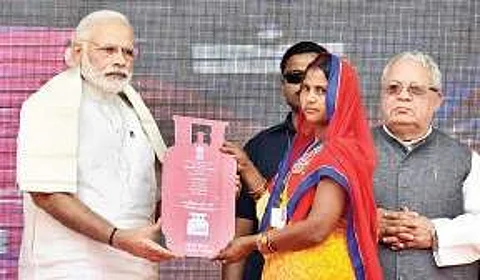

The Global Burden of Disease 2017 analysis indicates that household air pollution (HAP) from cooking with solid fuels (wood, dung, agricultural residues) in India can be attributed to 7.8 lakh deaths (more than smoking) in 2016, including 9,000 children under five years. This age-old public health crisis can be prevented if solid fuels are replaced with liquid petroleum gas (LPG).
Poor households traditionally viewed cooking with LPG as aspirational, yet prohibitively expensive. In response, the Ministry of Petroleum and Natural Gas (MoPNG) launched Ujjwala scheme that waives off security deposit for cylinder and regulator (Rs 1,600) for eligible beneficiaries while the stove and first refill (Rs 1,600) can be purchased as interest-free loan. Simultaneously, MoPNG guided oil-marketing companies to make LPG supply chain more efficient and customer responsive. As a result, three crore poor families have enrolled as LPG customers in the 18 months since Ujjwala’s launch.
Critics are concerned about Ujjwala customers’ low LPG refill rate (signalling usage) for two reasons. OMCs plan to recover Ujjwala loan amount by withholding the refill subsidy until it is paid off. If refill rates are slow, OMCs could face a major financial liability. More over, from a public health perspective, if LPG is used sporadically, cooking with solid fuels would continue to dominate and LPG ownership won’t significantly reduce risk for some HAP-linked deadly diseases like chronic bronchitis.
Hence, LPG should be used as a primary cooking fuel that roughly translates to at least four LPG refills per year for a family of five, which is not currently happening for majority of Ujjwala customers.
While these are valid concerns, the initial refill numbers are not the best indicators of Ujjwala’s performance. Expecting Ujjwala beneficiaries to immediately catch up to the national average defies common sense. OMCs are targeting the most marginalised 5 crore households out of the 10 crore identified in the 2011 Socio-Economic and Caste Census. Priority households for Ujjwala include rural households with no working age (18-59) adults, employed in unorganised sectors, and households with only one room, kuccha walls and kuccha roof. Further, rural households often have access to non-monetised solid fuels from forest and agricultural fields. Moreover, unlike LPG, traditional mud stove can serve dual purposes of space heating and cooking during winter months. In contrast, urbanised relatively affluent families who, sans access to solid fuels, often cook exclusively with LPG have primarily driven the national average of 6-7 annual refills.
Also, there is an under-emphasised disconnect between LPG promoters (government, heath researchers) and target households about LPG’s utility. Regular refills are currently not a budget priority for poor households for many reasons. One, the output of LPG is essentially that of a mud stove-cooked food. Two, households with irregular seasonal income have limited cash for around-the-year discretionary expenses. Three, male members, who often have veto power over household finance and don’t experience LPG’s benefits as directly as women cooks, can be unwilling to cut back on existing expenses to pay for refills. Four, LPG’s time saving (from quicker cooking and avoided firewood collection) does not always pay for refill costs. Two-hour extra time for Ujjwala beneficiaries who work as agricultural labourers may not result in a 25 per cent increase in daily-wage income. In contrast, mobile phone refills are viewed as priority expense as it provides communication services (output) that are unmatched in terms of utility with add-on entertainment.
During field-visits, we heard about inferior taste of food cooked in LPG, utility of mud stove’s smoke as insect-repellant and unwillingness to trade expenses on tobacco / alcohol with LPG refills. Hence, at the core of the Ujjwala refill issue is the challenge of changing people’s perceptions and behaviour. Families need to adjust to many perceived and real changes: food texture/ taste, cooking habits, and reallocation of household discretionary expenses. Getting people with age-old mindset and habit (of using mud stove) to switch to modern ‘useful and convenient’ (from expert perspective) LPG is easier said than done.
Behavioural psychologists have often applied the transtheoretical model (TTM) to visualise, explain and motivate long-term behavioural change pathways for health (smoking cessation) and pro-environmental (sustainable transportation) behaviour. Adopting this framework for the desired behaviour change goal of use LPG as primary cooking fuel provides three novel insights. First, behaviour change is not a one-time ‘adoption’ of technology but a five-stage process. Ujjwala’s efforts towards new connections have led millions to move from ‘pre-contemplation’ / ‘contemplation’ stages towards the ‘preparation’ stage by enhancing (affordable new connection) its benefits (pros).
Second, once households enroll and use LPG occasionally (preparation), emphasis on pros would no longer be effective to transition towards the action stage. It requires addressing the practical issues that hinder (cons) regular refills.
Third, it differentiates between effortful behaviour (action) and habit (maintenance) stages of regular usage. Someone at the maintenance stage would make more efforts to use LPG under adverse conditions (for example, price hikes).Ujjwala has helped rural poor to reach stage 3 of the five-stage behaviour change process. It has triggered a “blue-flame revolution” that could provide far-reaching health (reduce disease burdens), economic (income loss due to sickness), financial (OMCs’ expanded customer base), environmental (avoided deforestation) and social (women empowerment) dividends. Now, it must consolidate and build upon this succession order to maximise these benefits. Innovation in communication and policies, driven by behaviour psychology insights, can ‘nudge’ Ujjwala consumers to progress to the ‘maintenance’ stage, wherein near-exclusive LPG usage becomes a daily habit.
(Abhishek Kar is a PhD student and Hisham Zerriffi is an Associate Professor at the University of British Columbia in Canada)